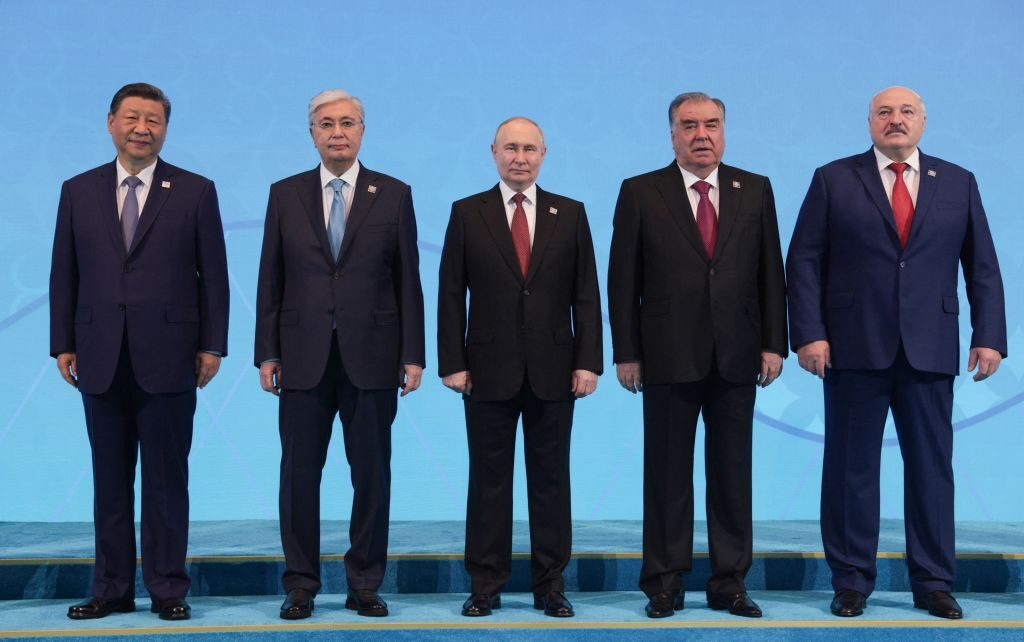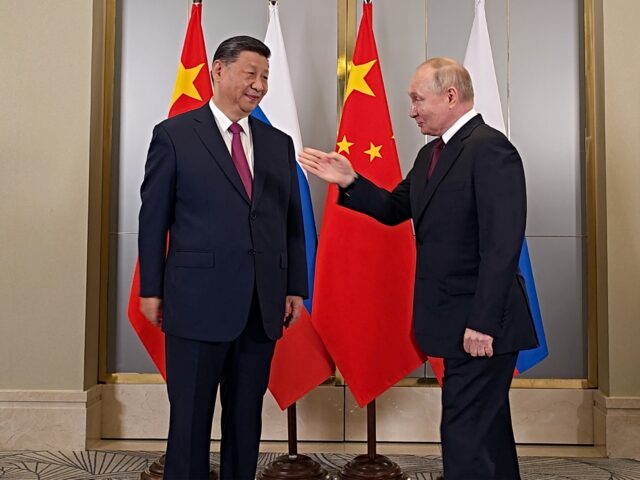Communist Chinese dictator Xi Jinping met with his Russian counterpart Vladimir Putin on Wednesday on the sidelines of the Shanghai Cooperation Organization (SCO) summit – their second meeting in two months and a sign their countries are experiencing a “golden age” of diplomacy, Putin said.
The SCO is a mostly Central Asian coalition focused on security and trade. In addition to China and Russia, the group consists of Uzbekistan, Kyrgyzstan, Kazakhstan, and Tajikistan, as well as India, Pakistan, and Iran. With strong support from Putin, the organization is expected to induct totalitarian Belarus as its first European member during its summit this week.
The SCO has largely been overshadowed by the rapidly expanding BRICS – which Russia, China, India, and Iran all also belong to – but Putin and Xi nonetheless praised the group as a “key pillar” in a reimagined “multipolar world order” in which the United States plays no major role. Their comments together, however, focused on Russia and China, and how the two countries have used trade ties to strengthen their positions against the free world and how they envision their relationship improving even further.
“We have repeatedly stated with good reason that Russia-China relations, our comprehensive partnership and strategic cooperation, are going through the best period in their history,” Putin said during the public part of his encounter with Xi, according to a translation by the Kremlin. “They are guided by the principles of equality, mutual benefit and respect for each other’s sovereignty. Our cooperation is not directed against anyone.”
“We do not create any blocs or alliances; we are simply acting in the interests of our people,” Putin added, while attending a summit for a China- and Russia-led bloc.
“Russian-Chinese cooperation in global affairs serves as a main stabilising factor on the international stage, and we continue to further enhance it,” Putin said.

In this pool photograph distributed by the Russian state agency Sputnik, Chinese President Xi Jinping, Kazakh President Kassym-Jomart Tokayev, Russian President Vladimir Putin, Tajik President Emomali Rakhmon and Belarusian President Alexander Lukashenko pose for a family photo during the Shanghai Cooperation Organisation (SCO) member states leaders’ summit in Astana on July 4, 2024. (GAVRIIL GRIGOROV/POOL/AFP via Getty)
The Russian news agency Tass described Putin as referring to a “golden age” in “equality and mutual respect” for China and Russia and fondly recalling his visit to China in May, which included a stop in the northern Chinese city of Harbin.
“When visiting Harbin, we all understood once again how close the historical ties between Russia and the People’s Republic of China are,” Putin reportedly asserted.
Harbin is home to a sizable Russian population and has long been home to a Russian minority, which is visible in its Russian-inspired architecture and local culture. Putin’s visit to Harbin in May, his first, included a stop in the “Little Moscow” neighborhood and in a local Orthodox church, which mainly served Russian expatriates (Orthodox Christianity is not among the five legal religions in communist China).
On Wednesday, Xi Jinping emphasized in his comments his personal relationship with Putin, calling him a “dear” and “old” friend. As he has repeatedly stated in past engagements, Xi suggested China and Russia should take the helm of global leadership, presumably away from America.
“Facing an international situation fraught with turbulence and changes, the two countries should keep upholding the original aspiration of lasting friendship,” Xi said, according to the Kremlin, “and sticking to the determination of benefiting the people, enhance the unique value of Chinese-Russian relations, cultivate new drivers of cooperation, and make tireless efforts to safeguard our legitimate rights and interests and safeguard the basic norms governing international relations.”
China’s state-run Global Times newspaper celebrated the meeting between the two leaders as a demonstration of how China and Russia have learned to cooperate to “eliminate Western pressure and resistance,” citing Chinese regime-approved “experts” pleased with the encounter.
“Experts said such high frequency of meetings signifies that under pressure from the West, Russia’s determination to ‘turn to the East’ is becoming more rock-solid,” the Global Times declared.
“This is especially important given today’s complex and chaotic world situation. And with the upcoming US presidential election, the international landscape is anticipated to become even more complicated,” one of the experts, think tank “scholar” Cui Heng, suggested – implying that China is preparing for the possibility that former President Donald Trump may return to power.
Another expert, researcher Yang Jin, said that “practical cooperation, especially how to eliminate Western pressure and resistance” was of paramount importance between Putin and Xi. Yang listed examples of this cooperation as largely including infrastructure cooperation, such as the development of a new gas pipeline and “new energy” projects.
Russian officials confirmed that approving development of the gas pipeline, known as “Power of Siberia-2,” was high on the list of issues Xi and Putin are seeking to move forward with.
“(The issue of the contract signing) was discussed (during Russian President Vladimir Putin’s visit to Astana to the SCO summit),” Russian Deputy Prime Minister Alexander Novak said on Wednesday. “The work will continue on approval of the terms and parameters. Instructions have been given to do it as soon as possible.”
Putin’s visit to China in May concluded with the signing of a 30-page document featuring a wide variety of agreements on cooperating in energy, agriculture, and scientific development.
Follow Frances Martel on Facebook and Twitter.

COMMENTS
Please let us know if you're having issues with commenting.